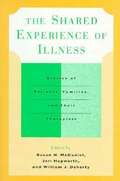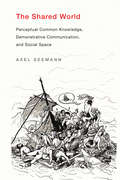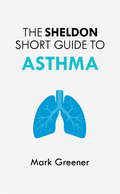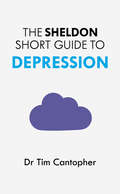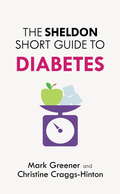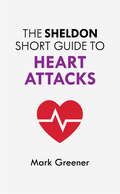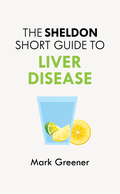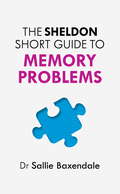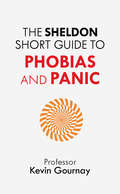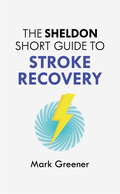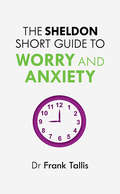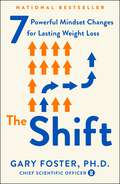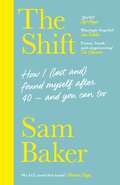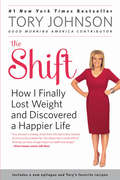- Table View
- List View
The Shared Experience of Illness: Stories of Patients, Families, and Their Therapists
by Susan H. Mcdaniel Jeri Hepworth William J. DohertyIn the narrative of every human life and family, illness is a prominent character. Even if we have avoided serious illness ourselves, we cannot escape its reach into our circle of family and friends. Illness brings us closer to one another through caregiving and separates us through disability and death, yet little attention has been paid to personal and family illness in psychotherapy. Rather, therapists tend to focus on the psychosocial realm, leaving the biological realm to other physicians and nurses. This groundbreaking volume shows the powerful benefits that can emerge when therapists acknowledge illness as a vital part of everyone's psychology. Susan H. McDaniel, Jeri Hepworth, and William J. Doherty invited therapists who work with individuals and families experiencing chronic illness and disability to describe clinical cases that illustrate their approach to medical family therapy. Contributors then were asked to share a personal story about their experiences with illness, and to explain how those experiences affect the way they work with their clients. Vivid case studies dealing with a range of illnesses, including cancer infertility, schizophrenia, AIDS, heart disease, diabetes, asthma, and multiple sclerosis, show how the therapists' own experiences of illness are relevant to their care of others-and how these experiences can be used to form a healing bond in therapy. As we head toward a new century, therapists play a central role in the delivery of comprehensive healthcare. We now know that psychology and social factors have a direct effect on the development and exacerbation of illness and disease, and that involvement of the family with the healthcare team is vital. Poignant, honest, and illuminating, The Shared Experience of Illness allows us to understand more fully the relationship between the personal and the professional. This invaluable work provides inspiration and insight for anyone working at the cuttifng edge of our healthcare system.
The Shared World: Perceptual Common Knowledge, Demonstrative Communication, and Social Space (The\mit Press Ser.)
by Axel SeemannA novel treatment of the capacity for shared attention, joint action, and perceptual common knowledge.In The Shared World, Axel Seemann offers a new treatment of the capacity to perceive, act on, and know about the world together with others. Seemann argues that creatures capable of joint attention stand in a unique perceptual and epistemic relation to their surroundings; they operate in an environment that they, through their communication with their fellow perceivers, help constitute. Seemann shows that this relation can be marshaled to address a range of questions about the social aspect of the mind and its perceptual and cognitive capacities.Seemann begins with a conceptual question about a complex kind of sociocognitive phenomenon—perceptual common knowledge—and develops an empirically informed account of the spatial structure of the environment in and about which such knowledge is possible. In the course of his argument, he addresses such topics as demonstrative reference in communication, common knowledge about jointly perceived objects, and spatial awareness in joint perception and action.
The Shattered Lantern: Rediscovering a Felt Presence of God
by Ronald RolheiserRolheiser gently guides us into spiritual contemplation, and awakening.
The Sheldon Short Guide to Asthma
by Mark GreenerAsthma affects 1.1 million children (1 in 11) and 4.3 million adults (1 in 12) in the UK – that’s one in five households. Fortunately, effective modern drugs mean that deaths from asthma are less rare than they used to be, especially in view of the millions of people who suffer from the disease in the UK. Nevertheless, one person dies from asthma in the UK every seven hours – and most are adults. Adults also account for 58 per cent of hospital admissions for asthma. The UK still has some of the highest asthma rates in Europe, yet, asthma in adults rarely gets the attention it deserves. This book aims to redress the balance. Topics include:What is asthma? Types of asthma Common asthma triggers Occupational asthma Diagnosing asthma in adults Treating asthma in adults Coping with asthma: beyond drugs
The Sheldon Short Guide to Asthma ("which?" Consumer Guides Ser.)
by Mark GreenerAsthma affects 1.1 million children (1 in 11) and 4.3 million adults (1 in 12) in the UK ? that?s one in five households. Fortunately, effective modern drugs mean that deaths from asthma are less rare than they used to be, especially in view of the millions of people who suffer from the disease in the UK. Nevertheless, one person dies from asthma in the UK every seven hours ? and most are adults. Adults also account for 58 per cent of hospital admissions for asthma. The UK still has some of the highest asthma rates in Europe, yet, asthma in adults rarely gets the attention it deserves. This book aims to redress the balance. Topics include:What is asthma? Types of asthma Common asthma triggers Occupational asthma Diagnosing asthma in adults Treating asthma in adults Coping with asthma: beyond drugs
The Sheldon Short Guide to Depression
by Tim CantopherDepression is a physical illness caused by malfunction of the limbic system, the brain circuitry which controls many of the body's processes, such as sleeping-waking cycles, temperature control, eating patterns, hormones - and mood. Depression ensues when the limbic system becomes overloaded, such as during periods of prolonged stress. This book explains the workings behind depression, and how to tackle this debilitating condition. Topics include: · What may trigger a depressive episode· What to do when you get ill · Recovery · Staying well · Treatments· Some skills for problem areas - relaxation, problem-solving, sleep
The Sheldon Short Guide to Depression: The Curse Of The Strong
by Tim CantopherDepression is a physical illness caused by malfunction of the limbic system, the brain circuitry which controls many of the body's processes, such as sleeping-waking cycles, temperature control, eating patterns, hormones - and mood. Depression ensues when the limbic system becomes overloaded, such as during periods of prolonged stress. This book explains the workings behind depression, and how to tackle this debilitating condition. Topics include: · What may trigger a depressive episode· What to do when you get ill · Recovery · Staying well · Treatments· Some skills for problem areas - relaxation, problem-solving, sleep
The Sheldon Short Guide to Diabetes
by Mark GreenerPoorly controlled diabetes can cut up to 20 years from your life expectancy. And it?s on the rise, affecting nearly 3 million people in the UK (1 in 20). Much suffering could be avoided if people took control of their diabetes sooner. This concise, authoritative guide shows how a healthy, balanced diet helps avoid the worse complications of diabetes such as cardiovascular disease, stroke, kidney disease, impotence and poor vision. Topics include: · The pancreas ? controlling glucose levels · Types of diabetes and their symptoms · Risk factors for diabetes · Complications of poorly controlled diabetes · Treating diabetes with drugs · Treating diabetes by changing your lifestyle · Diet and diabetes ? the first steps · Using supplements safely
The Sheldon Short Guide to Diabetes
by Mark GreenerPoorly controlled diabetes can cut up to 20 years from your life expectancy. And it’s on the rise, affecting nearly 3 million people in the UK (1 in 20). Much suffering could be avoided if people took control of their diabetes sooner. This concise, authoritative guide shows how a healthy, balanced diet helps avoid the worse complications of diabetes such as cardiovascular disease, stroke, kidney disease, impotence and poor vision. Topics include: · The pancreas – controlling glucose levels · Types of diabetes and their symptoms · Risk factors for diabetes · Complications of poorly controlled diabetes · Treating diabetes with drugs · Treating diabetes by changing your lifestyle · Diet and diabetes – the first steps · Using supplements safely
The Sheldon Short Guide to Heart Attacks
by Mark GreenerCoronary heart disease (CHD) still the leading cause of death in the UK - heart attacks kill about 88,000 people a year ? around one person every six minutes Despite these sobering statistics, a heart attack isn?t a death sentence, thanks to improved treatments and increased awareness. This short. Reassuring book shows how combining drugs and lifestyle changes can help you survive - and prevent - heart attacks. Topics include:· The anatomy and physiology of the cardiovascular system· Risk factors for heart attack · Causes of heart attacks· Symptoms in men, women, and the elderly· Why rapid treatment helps you survive· Prognosis and the prospects of living a normal life· How you and the doctor can increase the chances of survival
The Sheldon Short Guide to Heart Attacks
by Mark GreenerCoronary heart disease (CHD) still the leading cause of death in the UK - heart attacks kill about 88,000 people a year – around one person every six minutes Despite these sobering statistics, a heart attack isn’t a death sentence, thanks to improved treatments and increased awareness. This short. Reassuring book shows how combining drugs and lifestyle changes can help you survive - and prevent - heart attacks. Topics include:· The anatomy and physiology of the cardiovascular system· Risk factors for heart attack · Causes of heart attacks· Symptoms in men, women, and the elderly· Why rapid treatment helps you survive· Prognosis and the prospects of living a normal life· How you and the doctor can increase the chances of survival
The Sheldon Short Guide to Liver Disease
by Mark GreenerLiver disease is the leading cause of death in the UK after heart, cancer, stroke and respiratory disease. The good news is that liver disease can often be prevented or to some extent even repaired. This book looks at lifestyle factors and medical interventions that can help. Topics include: the liver and its functions types of liver disease and their symptoms, such as hepatitis, cirrhosis, alcoholic liver disease, non-alcoholic fatty liver disease (NAFLD) and cancer tests and checks treatments from your doctor lifestyle factors, such as cutting out alcohol and eating a healthy diet complementary remedies
The Sheldon Short Guide to Liver Disease
by Mark GreenerLiver disease is the leading cause of death in the UK after heart, cancer, stroke and respiratory disease. The good news is that liver disease can often be prevented or to some extent even repaired. This book looks at lifestyle factors and medical interventions that can help. Topics include: the liver and its functions types of liver disease and their symptoms, such as hepatitis, cirrhosis, alcoholic liver disease, non-alcoholic fatty liver disease (NAFLD) and cancer tests and checks treatments from your doctor lifestyle factors, such as cutting out alcohol and eating a healthy diet complementary remedies
The Sheldon Short Guide to Memory Problems
by Sallie BaxendaleFor every person who develops Alzheimer's, there are thought to be at least another eight whose memory problems are severe enough to affect the quality of their lives. If you are struggling with memory problems yourself or are caring for someone who has memory difficulties, this book has been written to help you cope. Topics include:why memory might go wrong why you never forget to ride a bikehow we retrieve information from our long term memoryword finding difficulties or the 'tip of the tongue' phenomena the role of anxiety, depression and stress in memory problemsdiet and exercisedementia and other neurological damagemyths and misconceptionswhen to seek further help
The Sheldon Short Guide to Memory Problems
by Sallie BaxendaleFor every person who develops Alzheimer's, there are thought to be at least another eight whose memory problems are severe enough to affect the quality of their lives. If you are struggling with memory problems yourself or are caring for someone who has memory difficulties, this book has been written to help you cope. Topics include:why memory might go wrong why you never forget to ride a bikehow we retrieve information from our long term memoryword finding difficulties or the 'tip of the tongue' phenomena the role of anxiety, depression and stress in memory problemsdiet and exercisedementia and other neurological damagemyths and misconceptionswhen to seek further help
The Sheldon Short Guide to Phobias and Panic
by Kevin GournayFor many people, life is made intolerable by phobias. Common fears may range from crowded places to a fear of spiders or blood, but, the basic underlying mechanism is the same – acute anxiety. This book looks at how to tackle both specific phobias and the anxiety which causes such disproportionate fear, and covers obsessive-compulsive disorder, social phobia, generalized anxiety state, and panic disorder with agoraphobia. Other topics include: Causes of anxiety and phobias Professional help and how to get it Planning a self-help programme Panic disorder and agoraphobia Dealing with catastrophic thoughts Lifestyle tools – exercise, relaxation, diet, alcohol, time
The Sheldon Short Guide to Phobias and Panic
by Kevin GournayFor many people, life is made intolerable by phobias. Common fears may range from crowded places to a fear of spiders or blood, but, the basic underlying mechanism is the same ? acute anxiety. This book looks at how to tackle both specific phobias and the anxiety which causes such disproportionate fear, and covers obsessive-compulsive disorder, social phobia, generalized anxiety state, and panic disorder with agoraphobia. Other topics include: Causes of anxiety and phobias Professional help and how to get it Planning a self-help programme Panic disorder and agoraphobia Dealing with catastrophic thoughts Lifestyle tools ? exercise, relaxation, diet, alcohol, time
The Sheldon Short Guide to Stroke Recovery
by Mark GreenerStroke can devastate mental and physical wellbeing, but, lifestyle changes, combined with medication, can reduce your risk of further stroke by 80 per cent. This short, easy to read guide advises on preventing stroke, making the most of medical treatment and living a full life after a stroke. Topics include:why and how a stroke may happen key warning symptoms risk factors diagnosis and treatmentrehabilitationadvice for carers
The Sheldon Short Guide to Stroke Recovery
by Mark GreenerStroke can devastate mental and physical wellbeing, but, lifestyle changes, combined with medication, can reduce your risk of further stroke by 80 per cent. This short, easy to read guide advises on preventing stroke, making the most of medical treatment and living a full life after a stroke. Topics include:why and how a stroke may happen key warning symptoms risk factors diagnosis and treatmentrehabilitationadvice for carers
The Sheldon Short Guide to Worry and Anxiety
by Frank TallisWorry is a useful biological response to adverse circumstances, which can sometimes get out of hand. While the anxiety response primes us for action, too much becomes counterproductive. This easy-to-read manual explains how to understand and control your worry, and make the brain's warning system work for you. Topics include:· Defining worry and its mechanism· Preparing to solve your problems - skills to practise· How to solve your problems· Brainstorming and making decisions· Coping with setbacks· When the worry won't stop · Coping successfully with unavoidable problems
The Sheldon Short Guide to Worry and Anxiety
by Frank TallisWorry is a useful biological response to adverse circumstances, which can sometimes get out of hand. While the anxiety response primes us for action, too much becomes counterproductive. This easy-to-read manual explains how to understand and control your worry, and make the brain's warning system work for you. Topics include:· Defining worry and its mechanism· Preparing to solve your problems - skills to practise· How to solve your problems· Brainstorming and making decisions· Coping with setbacks· When the worry won't stop · Coping successfully with unavoidable problems
The Shere Hite Reader: New and Selected Writings on Sex, Globalism, and Private Life
by Shere HiteThe Shere Hite Reader presents wide-ranging analysis on the individual and society from a renowned thinker on psychosexual development. The book includes new science in addition to previously published material, reflecting Hite's three decades of work probing the roots of human identity through questionnaires and theory.For the first time Hite formalizes her thinking on male adolescence, that boys feel tortured by the new social role they are forced to assume at puberty requiring a show of superiority toward females. In new detail Hite advances her understanding that sex is political, linking the expectation on women to achieve orgasm through coitus with broader patterns of oppression. Hite discusses new research on female adolescence, challenging the "virgin" hymen concept, and documenting that sexual awakening often precedes puberty. Hite also argues that pornography misrepresents male sexuality (not to mention female sexuality), depicting it as singular and silly instead of "full of intriguing, nuanced behavior involving the entire body, not just the penis."The authoritative collection of her work, The Shere Hite Reader challenges the reader to a new way of seeing.
The Shift: 7 Powerful Mindset Changes for Lasting Weight Loss
by Gary FosterThe Shift is not about what to eat or not eat. It’s not about when to eat. It’s about building thinking habits, proven through science, that help you lose weight.There are so many myths surrounding weight loss: Setbacks mean failure. Big results require big goals. You need to power through alone. You have to hate your body to lose weight. Happiness awaits you only at the end of the journey.All of these are untrue, unhelpful—and actually undermine long-term weight loss.Dr. Gary Foster’s 7 Mindset Shifts show you how to—and why you should—treat yourself in a way that feels better and primes you for likelier success. His argument and the techniques in each chapter, built on years of research and breakthroughs in cognitive behavioral therapy and positive psychology, can lead to results on the scale—but, more important, in your own thinking. The Shift flips old-fashioned weight-loss theory on its head, training you to recognize when your thinking is taking you away from your goals, to focus on action rather than outcome, and to value non-scale victories more than the number on the digital display. It’s evidence-based motivation—and it really works!The 7 Mindset Shifts include treating yourself with compassion, leaning into your strengths, appreciating the power of small steps (and more frequent rewards), finding your people, and truly relaxing into happiness and gratitude.“Diet thinking” isn’t habit-forming; mindset shifts are. And muscular yet kind mental habits, like the ones found in The Shift, are key to long-term, positive change.
The Shift: BECAUSE MENOPAUSE IS OUR SUPERPOWER
by Sam Baker'A compelling voice within [the menopause] movement' DAILY TELEGRAPH'If you're a woman over 40, ever going to be a woman over 40 or you've ever met a woman over 40 you should read this book' JANE FALLON'I NEED this book. We ALL need this book! If menopause happened to men, there would be CELEBRATIONS and parties every time one of them completed their change.' MARIAN KEYES'Funny, frank and empowering... a vital book for any woman who is at the beginning of her radicalisation journey, looking at her life and finally piecing together the personal and the political.' THE OBSERVER'Sam Baker is rewriting the narrative around menopause' WOMAN & HOME'rollicking read' MAIL ON SUNDAY'I loved it.. blazingly hopeful and beautifully written. This book is meant to be mainlined.' LISA TADDEO'This gem is a guide to navigating your 40s and 50s and just generally being yourself. ... joyful, positive, and goes to ALL the places. Highly recommended.' JOJO MOYESThe essential manifesto for any woman staring the second half of their lives in the face and wondering, WTF is going on?* Invisible to society now you're past child-bearing age?* Tired of being disregarded, overlooked and underestimated?* Wondering what the hell is happening to your body, mind and internal thermostat?Women over forty are the most ignored demographic in society. And yet this is the time when you are likely to have the most freedom, power, confidence and self knowledge than ever before. Some serious life has been lived: there have been great loves, heartbreaks, births, marriages, careers, betrayals, bereavements and survival. So what now? What happens when the narrative given to you by society - husband, babies, house - runs out and you become storyless? Including chapters on menopause, sex, culture, work, rage and freedom, writer and journalist Sam Baker shares her experiences of life post 40 and shows how women to create their own story. This needn't herald the era of loose clothing and hair dye; or hot flashes and bad sleep (though there is that too). It's time women north of 40 took a leaf out of the millennial handbook and reinvented things our way. Sam hosts a podcast of the same name, now with over 50 thousand downloads. Harness your energy, opinions and power and create a liberating new narrative for the second half of life.'I am so glad The Shift exists. Sam's writing is a wonderful generous mixture of no-bullsh*t and a comforting hug. I'll be passing this book on to many women I know and love.' EMMA GANNON 'brilliant - powerful, brimming with integrity, inspiring, the politics of anger and what it means when we refuse to be invisible. Every woman (whatever her age) should buy, borrow, lend a copy' KATE MOSSE'This is such a painfully beautiful look at the menopause in all its complexity. As honest as it is insightful, this is the first book I've read about later womanhood that exchanges shame and fear for truth and celebration... does for 40-something women what the honest parenting movement did for mothers.' ANNA WHITEHOUSE, founder, Mother Pukka'great pace and feisty content. It will be a great help to women to see their lives mirrored and not feel like they are going mad... bold and funny.' CARYN FRANKLIN'[Sam] tackles the menopause with her customary wit and wisdom' i PAPER'Honest and witter account of life post-40. Makes for essential reading at any age.' - KATE WILLS, FABULOUS MAGAZINE'Insightful, thoughtful, inspirational - impressive work.' - VICTORIA DERBYSHIRE
The Shift: How I Finally Lost Weight and Discovered a Happier Life
by Tory JohnsonA single conversation with a boss forced Tory Johnson to face the one challenge that had always defeated her: her weight. After a lifetime of obesity, of failing at fad diets and sporadic health programs, Tory made the shift by recognizing that it was time to lose weight once and for all, and do it her way. In twelve months, she lost more than 60 pounds, and for the first time shares what she learned, what she ate and how she changed in THE SHIFT: How I Finally Lost Weight and Discovered a Happier Life, her most personal book yet.In this updated trade paperback edition, Tory Johnson adds a look back at the amazing response her Shift has brought from thousands of people across the country, shares additional lessons learned in the year following the book's publication, and includes the stories of "Shifters"--readers so inspired by her book they have made their own life-changing Shifts. THE SHIFT is not a one-woman weight-loss journey; THE SHIFT is a gutsy look at what it takes to undo a lifetime of self-sabotaging habits and feel great about the change and yourself.
